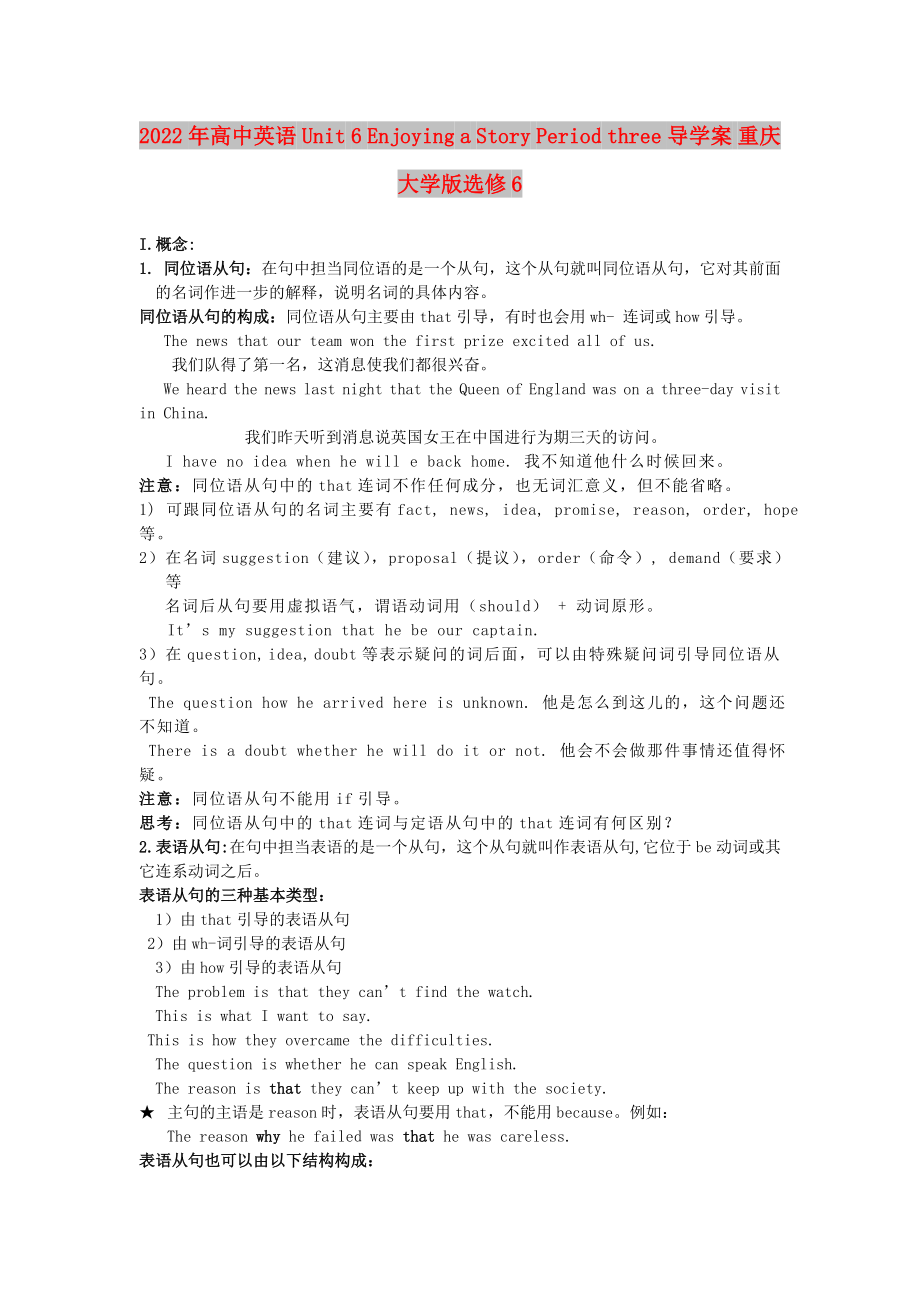《2022年高中英語(yǔ) Unit 6 Enjoying a Story Period three導(dǎo)學(xué)案 重慶大學(xué)版選修6》由會(huì)員分享��,可在線(xiàn)閱讀����,更多相關(guān)《2022年高中英語(yǔ) Unit 6 Enjoying a Story Period three導(dǎo)學(xué)案 重慶大學(xué)版選修6(3頁(yè)珍藏版)》請(qǐng)?jiān)谘b配圖網(wǎng)上搜索�����。
1、2022年高中英語(yǔ) Unit 6 Enjoying a Story Period three導(dǎo)學(xué)案 重慶大學(xué)版選修6
I.概念:
1. 同位語(yǔ)從句:在句中擔(dān)當(dāng)同位語(yǔ)的是一個(gè)從句�,這個(gè)從句就叫同位語(yǔ)從句,它對(duì)其前面的名詞作進(jìn)一步的解釋?zhuān)f(shuō)明名詞的具體內(nèi)容��。
同位語(yǔ)從句的構(gòu)成:同位語(yǔ)從句主要由that引導(dǎo)���,有時(shí)也會(huì)用wh- 連詞或how引導(dǎo)�。
The news that our team won the first prize excited all of us.
我們隊(duì)得了第一名����,這消息使我們都很興奮。
We heard the news last night that t
2��、he Queen of England was on a three-day visit in China.
我們昨天聽(tīng)到消息說(shuō)英國(guó)女王在中國(guó)進(jìn)行為期三天的訪(fǎng)問(wèn)��。
I have no idea when he will e back home. 我不知道他什么時(shí)候回來(lái)�。
注意:同位語(yǔ)從句中的that連詞不作任何成分,也無(wú)詞匯意義�����,但不能省略。
1) 可跟同位語(yǔ)從句的名詞主要有fact, news, idea, promise, reason, order, hope等�����。
2)在名詞suggestion(建議)�,proposal(提議),order(命令),
3�����、demand(要求)等
名詞后從句要用虛擬語(yǔ)氣��,謂語(yǔ)動(dòng)詞用(should) + 動(dòng)詞原形����。
It’s my suggestion that he be our captain.
3)在question, idea, doubt等表示疑問(wèn)的詞后面,可以由特殊疑問(wèn)詞引導(dǎo)同位語(yǔ)從句����。
The question how he arrived here is unknown. 他是怎么到這兒的,這個(gè)問(wèn)題還不知道��。
There is a doubt whether he will do it or not. 他會(huì)不會(huì)做那件事情還值得懷疑�����。
注意:同位語(yǔ)從句不能用if引導(dǎo)。
思考:同
4�、位語(yǔ)從句中的that連詞與定語(yǔ)從句中的that連詞有何區(qū)別?
2. 表語(yǔ)從句: 在句中擔(dān)當(dāng)表語(yǔ)的是一個(gè)從句����,這個(gè)從句就叫作表語(yǔ)從句,它位于be動(dòng)詞或其它連系動(dòng)詞之后���。
表語(yǔ)從句的三種基本類(lèi)型:
1)由that引導(dǎo)的表語(yǔ)從句
2)由wh-詞引導(dǎo)的表語(yǔ)從句
3)由how引導(dǎo)的表語(yǔ)從句
The problem is that they can’t find the watch.
This is what I want to say.
This is how they overcame the difficulties.
The question is wh
5�、ether he can speak English.
The reason is that they can’t keep up with the society.
★ 主句的主語(yǔ)是reason時(shí)�,表語(yǔ)從句要用that,不能用because�����。例如:
The reason why he failed was that he was careless.
表語(yǔ)從句也可以由以下結(jié)構(gòu)構(gòu)成:
It seems that(好像)/ It appears that(似乎)/ It turns out that(結(jié)果是),
It happens that(恰好����,碰巧)
e.g. : It s
6、eems that he will go abroad.
注意: a. 表語(yǔ)從句中的that連詞不作任何成分�����,也無(wú)詞匯意義,但不能省略���。
b. 表示“是否” , 在表語(yǔ)從句中不能用if�����,只能用whether����。
II. 連詞的正確選用: 根據(jù)連詞的詞義和所充當(dāng)?shù)木渥映煞终_選用連詞���。
【試一試】
1. He often asked me the question ____ the work was worth doing.
A. whether B. where C. that D.
7����、when
2. The order ____ the prisoner be set free arrived too late.
A. which B. whether C. that D. what
3. Do you have any idea ___ is actually going on in the classroom?
A. that B. what C. as
8���、 D. which
4. — Are you still thinking about yesterday’s game?
— Oh, that’s ______.
A. what makes me feel excited B. whatever I feel excited about
C. how I feel about it D. when I feel excited
5. She looked _____ she were ten years younger.
9���、
A. that? B. as though C. as??? D. like
6. Maria has to baby-sit. That’s _____ she can’t e out with us.
A. why B. how C. when D. what
III.名詞性從句需要注意的幾個(gè)問(wèn)題:
1.語(yǔ)序問(wèn)題:所有名詞性從句都用陳述語(yǔ)氣。
2. 時(shí)態(tài)問(wèn)題:從句的時(shí)態(tài)要與主句相呼應(yīng)
10����、���。
3.名詞性從句中的that/which和定語(yǔ)從句中的that/which 的區(qū)別。
4.名詞性從句中that和what的區(qū)別��。
5. 名詞性從句中which和what的區(qū)����。
6. 名詞性從句中if和whether的區(qū)別。
下列情況下一般只能用whether��,不用if �。
A. 引導(dǎo)主語(yǔ)從句���,表語(yǔ)從句和同位語(yǔ)從句時(shí)���; B. 作介詞的賓語(yǔ)從句時(shí);
C. 從句后有“or not”時(shí)����; D. 后接動(dòng)詞不定式時(shí); E. 作discuss 的賓語(yǔ)從句時(shí)�;
7. Who / whoever, what / whatever 與 no
11、matter who / what...
A. 一般說(shuō)來(lái)��,what/who等含特指意義,而whatever/whoever等含泛指意義�, 意為“無(wú)論什么/無(wú)論誰(shuí)”(含有強(qiáng)調(diào)意味)。
B. whatever, whoever... 既可以引導(dǎo)名詞性從句也可以引導(dǎo)讓步狀語(yǔ)從句�; 而no matter what / who ...只能引導(dǎo)讓步狀語(yǔ)從句。
【試試看】
1. Sarah hopes to bee a friend of __ shares her interests.
A. anyone B. whomever C. whoever D. no matter who
2. It was a matter of _____would take the position.
A. who B. whoever C. whom D .whomever
 2022年高中英語(yǔ) Unit 6 Enjoying a Story Period three導(dǎo)學(xué)案 重慶大學(xué)版選修6
2022年高中英語(yǔ) Unit 6 Enjoying a Story Period three導(dǎo)學(xué)案 重慶大學(xué)版選修6

